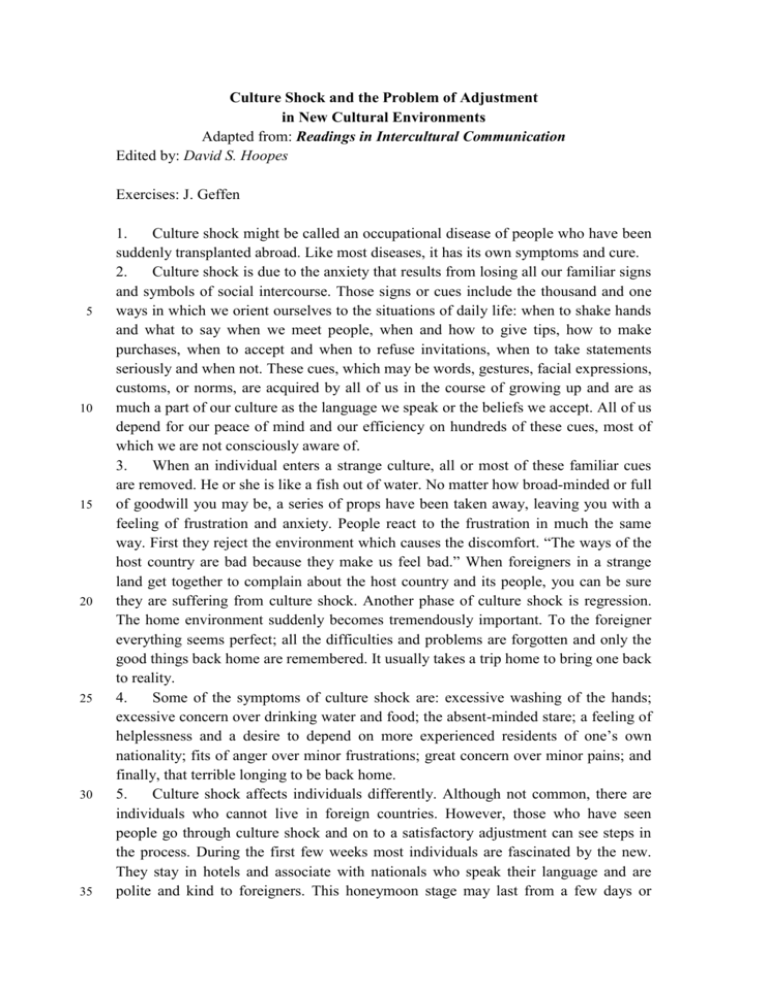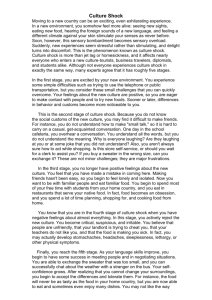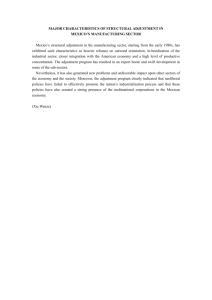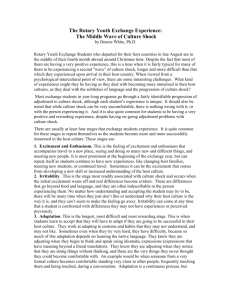Exercises: J. Geffen
advertisement

Culture Shock and the Problem of Adjustment in New Cultural Environments Adapted from: Readings in Intercultural Communication Edited by: David S. Hoopes Exercises: J. Geffen 5 10 15 20 25 30 35 1. Culture shock might be called an occupational disease of people who have been suddenly transplanted abroad. Like most diseases, it has its own symptoms and cure. 2. Culture shock is due to the anxiety that results from losing all our familiar signs and symbols of social intercourse. Those signs or cues include the thousand and one ways in which we orient ourselves to the situations of daily life: when to shake hands and what to say when we meet people, when and how to give tips, how to make purchases, when to accept and when to refuse invitations, when to take statements seriously and when not. These cues, which may be words, gestures, facial expressions, customs, or norms, are acquired by all of us in the course of growing up and are as much a part of our culture as the language we speak or the beliefs we accept. All of us depend for our peace of mind and our efficiency on hundreds of these cues, most of which we are not consciously aware of. 3. When an individual enters a strange culture, all or most of these familiar cues are removed. He or she is like a fish out of water. No matter how broad-minded or full of goodwill you may be, a series of props have been taken away, leaving you with a feeling of frustration and anxiety. People react to the frustration in much the same way. First they reject the environment which causes the discomfort. “The ways of the host country are bad because they make us feel bad.” When foreigners in a strange land get together to complain about the host country and its people, you can be sure they are suffering from culture shock. Another phase of culture shock is regression. The home environment suddenly becomes tremendously important. To the foreigner everything seems perfect; all the difficulties and problems are forgotten and only the good things back home are remembered. It usually takes a trip home to bring one back to reality. 4. Some of the symptoms of culture shock are: excessive washing of the hands; excessive concern over drinking water and food; the absent-minded stare; a feeling of helplessness and a desire to depend on more experienced residents of one’s own nationality; fits of anger over minor frustrations; great concern over minor pains; and finally, that terrible longing to be back home. 5. Culture shock affects individuals differently. Although not common, there are individuals who cannot live in foreign countries. However, those who have seen people go through culture shock and on to a satisfactory adjustment can see steps in the process. During the first few weeks most individuals are fascinated by the new. They stay in hotels and associate with nationals who speak their language and are polite and kind to foreigners. This honeymoon stage may last from a few days or Culture Shock and the Problem of Adjustment / 2 40 45 50 55 60 65 70 75 weeks to six months, depending on circumstances. If one is very important, he or she will be shown the special places, will be pampered, and in a press interview will speak glowingly about goodwill and international friendship. 6. But this mentality does not normally last if the foreign visitor remains abroad and has to cope seriously with real conditions of life. It is then that the second stage begins, characterized by a hostile and aggressive attitude toward the host country. This hostility grows out of the real difficulty which the visitor experiences in the process of adjustment. There are house troubles, transportation troubles, shopping troubles, and the fact that people in the host country are generally indifferent to all these troubles. They help, but they don’t understand your great concern over these difficulties. Therefore, they must be insensitive and unsympathetic to you and your worries. The result: “I just don’t like them.” You become aggressive; you band together with others from your country and criticize the host country, its ways, and its people. But this criticism is not objective. Instead of trying to understand the conditions and the historical circumstances which have created them, you talk as if your difficulties are more or less created by the people of the host country for your special discomfort. 7. You try to meet as often as possible with others from your original country, and these meetings provide you with negative labels – known as “stereotypes” – about the local people. A stereotype is a special kind of term which caricatures the host country and its people in a negative manner. The “dollar grasping American” and the “indolent Latin American” are samples of mild forms of stereotypes. The second stage of culture shock is in a sense a crisis in the disease. If you come out of it, you stay; if not, you leave before you have a nervous breakdown. 8. If visitors succeed in getting some knowledge of the language and begin to get around by themselves, they are beginning to open the way into the new cultural environment. Visitors still have difficulties but they take a “this is my problem and I have to bear it” attitude. Usually in this third stage visitors take a superior attitude to people of the host country. Their sense of humor begins to show itself. Instead of criticizing, they joke about the people and even about their own difficulties. They are now on the way to recovery. 9. In the fourth stage, your adjustment is about as complete as it can be. The visitor now accepts the customs of the country as just another way of living. You operate within the new surroundings without a feeling of anxiety, although there are moments of social strain. Only with a complete grasp of all the cues of social intercourse will this strain disappear. For a long time the individual will understand what the national is saying but is not always sure what the national means. With a complete adjustment you not only accept the food, drinks, habits, and customs, but actually begin to enjoy them. When you go home on leave, you may even take things back with you; and if you leave for good, you generally miss the country and the people to whom you became accustomed. Culture Shock and the Problem of Adjustment / 3 Answer in your own words. Answer the question below in English. 1. What does the title itself suggest? Answer: _________________________________________________________ ________________________________________________________________ ________________________________________________________________ ________________________________________________________________ Answer the question below in Hebrew. 2. List some of the underlying causes – paragraph 2 – of culture shock. Answer: _________________________________________________________ ________________________________________________________________ ________________________________________________________________ ________________________________________________________________ Answer the question below in Hebrew. 3. What all-important human characteristic is suggested by the information provided in paragraph 2? Answer: _________________________________________________________ ________________________________________________________________ ________________________________________________________________ ________________________________________________________________ Answer the question below in English. 4. How are foreigners in a strange land – paragraph 3 – likely to react when first faced with the new culture? Answer: _________________________________________________________ ________________________________________________________________ ________________________________________________________________ ________________________________________________________________ Answer the question below in English. 5. How are foreigners – paragraph 3 – likely to perceive their previous experiences in their mother land? Answer: _________________________________________________________ ________________________________________________________________ ________________________________________________________________ ________________________________________________________________ Answer the question below in Hebrew. 6. Compare the difficulties of adjustment of the well-to-do and prominent foreigner – paragraph 5 – with those of his less fortunate fellow nationals. Answer: _________________________________________________________ ________________________________________________________________ ________________________________________________________________ ________________________________________________________________ Culture Shock and the Problem of Adjustment / 4 Choose the best answer. 7. Foreign visitors – paragraph 6 – are likely to perceive their discomforts as a function of a) negligence. b) inefficiency. c) misunderstandings.. d) ill-will. Answer the question below in English. 8. Why do foreigners in a new land – paragraph 7 – tend to band together with their fellow nationals? Answer: _________________________________________________________ ________________________________________________________________ ________________________________________________________________ ________________________________________________________________ Answer the question below in English. 9. Name the prerequisite – paragraph 8 – for adjustment to the new cultural environment. Answer: _________________________________________________________ ________________________________________________________________ ________________________________________________________________ Answer the question below in Hebrew. 10. Explain the difference between understanding what the national says – paragraph 9 – and what he means. Answer: _________________________________________________________ ________________________________________________________________ ________________________________________________________________ ________________________________________________________________







